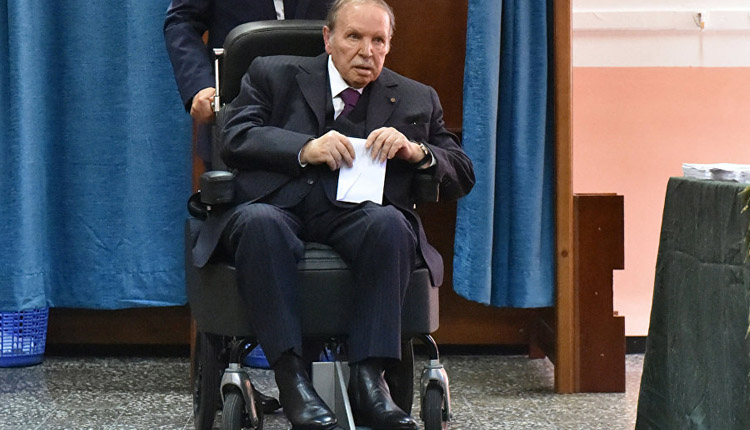President Abdelaziz Bouteflika arrives in Algeria Ennahar TV said, after spending two weeks in a Swiss hospital while protesters have massed at home in the biggest threat to his 20-year rule.
An Algerian government plane transporting the president arrived at Boufarik military airport just southwest of the capital. Top Algerian officials often use that airport.
Tens of thousands of Algerians of all social classes have protested over the past three weeks against Bouteflika’s decision to stand in April’s election.
In the clearest indication yet that the generals sympathize with them, the chief of staff said the military and the people had a united vision of the future, state TV reported. Lieutenant General Gaed Salah did not mention the protests.
The ruling FLN party urged all sides to work together to end the political crisis, Ennahar TV said. It wants national reconciliation and to preserve security and stability, the station said.
But there are no signs Algerians are prepared to heed that call after rejecting Bouteflika’s offer to limit his term after the election.
‘No Fifth Term’
“Bouteflika’s system is over,” said a commentator on Ennahar TV, which is close to the president’s inner circle, noting that some of the Bouteflika’s allies have joined the protests.
Ennahar TV also said Bouteflika underwent routine medical checks in Geneva.
On Sunday, thousands took to the streets of the capital carrying the Algerian flag and chanting: “Bouteflika, there will be no fifth term”. Many shops in Algiers were closed and residents said train services had been suspended.
“We have taken to the streets today to protest a fifth presidential term. We are against a fifth term. This is enough,” protester Zakaria said in front of the Central Postal Office.
Young Algerians are desperate for jobs and angry about unemployment, corruption and an elderly elite in the North African country, a major oil and gas producer.
“The current system is unable to provide jobs,” said Farid Kahil, 27, who is unemployed.
A general strike has hit the country’s Mediterranean oil ports of Skikda and Bejaia but exports were not affected, according to port staff.
Bouteflika managed to remain in power as the “Arab Spring” uprising toppled autocrats in neighboring countries in 2011 because Algeria had enough foreign reserves to boost state spending.
Older Algerians haunted by the civil war in the 1990s tolerated crackdowns on dissent in exchange for stability, giving the government some breathing space. Now some have appeared at demonstrations to demand reforms.
“We need a new generation to govern us and secure a better future for our children,” said pensioner Ahmed, 63.
Even if Bouteflika’s position becomes untenable, it is not clear who could replace him. Algeria has stagnated for decades under veterans of the independence war who dominate the country.
For years, rumors have swirled about potential successors, but no one credible has emerged who has the backing of the army and elite and is not in their 70s or 80s.
Algeria’s chief of staff has warned that chaos would not be tolerated. The military has stayed in barracks.
Several public figures, including members of Bouteflika’s FLN party and lawmakers have resigned to join the rallies against a political system dominated by war veterans since independence from France in 1962.
Two branches of the powerful labor union UGTA, representing tens of thousands of workers, have opposed the re-election plan and lawyers have also joined rallies.
Algerians packed central Algiers to capacity on Friday in the biggest protests in the capital in 28 years. Security forces detained 195 people, state television said, citing offences such as looting.


